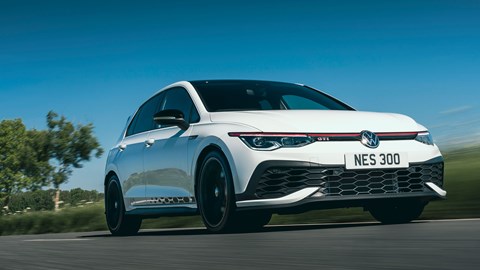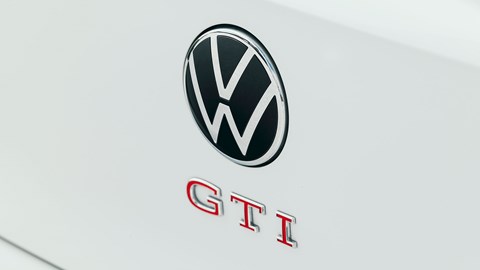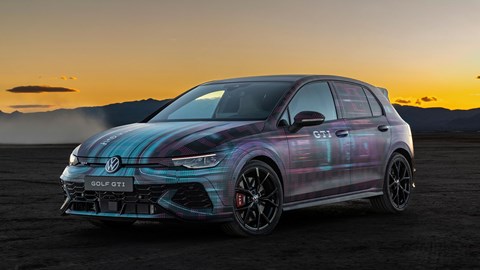► Volkswagen Golf GTI won’t abandon petrol power yet
► Could either be an all-new car or an updated Mk8
► Golf could become entry point to VW’s petrol range
Volkswagen’s approach to electrification is a little more conservative than its competitors. Fiat is calling time on its petrol-powered cars in 2030, while Vauxhall says it’ll only produce electric cars from 2028. But Volkswagen? It’s planning to cling to combustion power until 2033.
That’s a smart move because, even by the time 2030 rolls around, we doubt there’ll have been enough investment in EV infrastructure and significant enough improvements in battery technology to make electric cars as convenient to own as petrol cars. At least at the price point mainstream brands such as Fiat, Vauxhall and Volkswagen are targeting.
This is good news for enthusiasts, because it means Volkswagen has an excuse to keep the petrol-powered Golf GTI alive for longer – and, after speaking with Michael Blaul, Volkswagen’s product marketing manager, at an event in Berlin earlier this month, CAR magazine has learned that’s exactly what the firm intends to do.
He told us: ‘If you want to buy a GTI in the future, with the petrol engine, you will be able also 2028 onwards. We know things much better after the European election. But until this point of time, the Golf will survive a few years. So, until 2030-something, we will see a Golf on the street.’
How will Volkswagen keep the petrol Golf GTI around?
That remains closely guarded secret. However, CAR magazine understands there are two options on Volkswagen’s table – work with what it already has or create something fresh.
To us, the most tactical solution would be to extend the current Golf’s life cycle into the 2030s, potentially giving the car a second facelift in 2028 to create a Mk8.75 model that can tide the brand over until it needs to go all electric. When pressed for comment, Blaul said: ‘that could be a possible solution, yes.
‘That’s very strategic and, me as a product marketing manager, I’m fighting for it of course. But the head of the whole company, who are managers, who try to focus differently. So, it’s hard times for us I would say.’

To lend further credence to the theory, we asked Blaul whether the current Golf could be made Euro 7 compliant. He replied with: ‘yes, and we will also achieve the targets with our normal Golf model. But the sporty versions could be – we’d have to decide where to focus on. I would say the GTI will survive as well.’
The second option is that the Mk9 Golf will be available with both petrol and electric power. However, this seems much less likely considering Volkswagen has already confirmed the car will be based on the Group’s electric-only SSP architecture.
The only way Volkswagen could make this second scenario work would be to adopt the same approach MINI did with its latest three-door hatch. There’s an electric and a petrol-powered version of that car. The electric model is based on all-new, pure-electric underpinnings, while the petrol version is essentially a heavily updated version of the previous car – but you’d struggle to tell them apart if you weren’t in the know.

To the untrained eye, the two cars look very similar. The petrol model has the same bang up-to-date infotainment system as the electric car and its body has been cleverly styled to look like the EV. Compare the two cars side-by-side, though, and you’ll see they have completely different windscreen rakes, and they aren’t even the same size.
Volkswagen could adopt the same strategy by pinching Audi’s Premium Platform Combustion architecture (which will be used under the next-generation A5 coupe and Q5 SUV) and building the petrol Mk9 Golf on that. However, the only sticking point we see is that the chassis might make the car a little too expensive to be profitable.
How will Volkswagen’s petrol line-up change?
There will be sacrifices. Euro 7 emissions regulations and legislation such as the UK’s ZEV mandate will gradually push the worst-performing cars out to pasture. For example, Volkswagen is much less precious about keeping the Polo supermini around – and the second it starts costing money in fines, the company won’t hesitate to swing the axe.
When quizzed on whether we can expect another evolution of the petrol Polo, Blaul said: ‘as far as I know, I guess the ID.2 will be a lot of things customers expect from an electric Polo. The problem is, to bring the Euro 7 to the end of the petrol or gasoline engines, that Euro 7 will be so expensive for the whole cars that it’s impossible to stay with the Polo and all those cars below the Golf.

‘Probably in a few years, the Golf will be the entry in a gasoline engine in the Volkswagen world. That could be a scenario which could be a reality.
‘It’s also difficult to manage so many different types of engines over the years from an investment perspective. So, you cannot do so many different things in parallel. You have to decide which way you want to go – and our strategic position in the past was we go the electric way.’
We’ll keep you updated on how the process plays out. For now, take comfort in the fact that, if you’re a petrolhead fretting about the crushing dominance of EV legislation, you’ll still be able to get your fix from Volkswagen for the next few years.